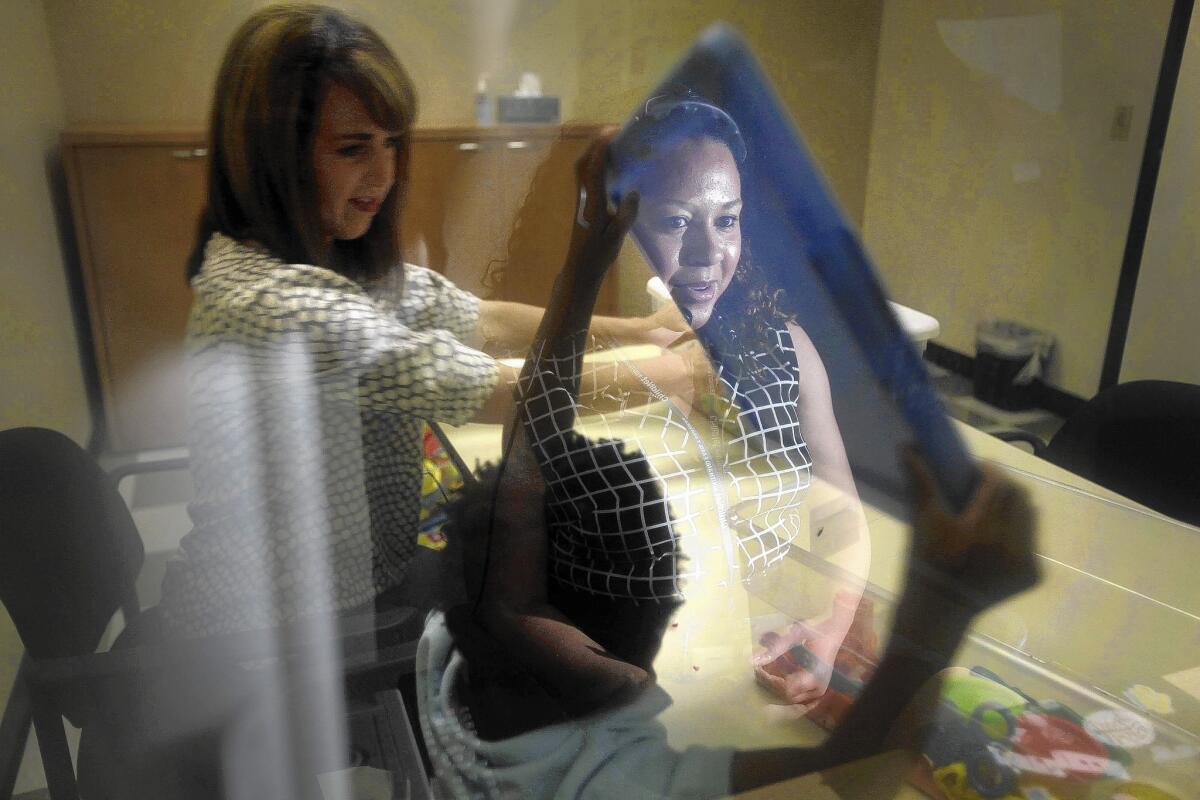Even the best parents can use an assist in helping troubled children

Adria Ponsar and her son Rhyon are huddled over a child-sized table scattered with pieces of Mr. Potato Head. She is wearing an earpiece that the 4-year-old doesn’t see. Rhyon is frantically sifting through the pile for the body part he needs.
On the other side of a mirrored wall, social worker Aja Bryant murmurs into a mic, coaching Ponsar through the play session with scripted precision.
The mother compliments her son on handling the toy gently. Good label praise, Bryant whispers into the microphone. Good reflecting. Direct him to the red nose in the potato head box.
The clinician weighs in on Ponsar’s every move as mother and son play — prompting, praising, sometimes dictating word-for-word what the mother should say.
After months of these coaching sessions, the mother has become an A student. Ponsar is encouraging, attentive, direct, tender and generous with praise:
Thank you for helping me get the top off the Play-Doh. Thank you for putting the toys away so nicely. Thank you for listening.
Her son heard “thank you” more often in that hour than my children probably heard in months.
That seemed a bit much to me, until I learned what Rhyon has been through. He was taken from his birth mother because of neglect before he was 2. Ponsar and her husband became his foster parents and adopted him last year.
Rhyon was so used to being hungry, he scavenged for food and wolfed down anything he could eat. He was so accustomed to being screamed at, he tuned out parental guidance and didn’t trust adults.
The scripted play sessions helped correct Rhyon’s behavior problems. But more than that, they strengthened the bond between mother and son.
“He used to do things for negative attention — which I would always respond to,” said Ponsar. “Now there’s a sweetness I feel in our behavior toward each other.
“It’s so easy sometimes to focus on what your child is doing wrong. It means a lot to Rhyon to have somebody pay attention to him for something good.”
::
The coaching sessions are part of a process called Parent-Child Interaction Therapy. It’s a labor-intensive intervention that’s been shown to pay dividends for troubled families.
The therapy is offered in Los Angeles by a handful of social service agencies, including ChildNet in Long Beach, where I watched Ponsar’s session. Some parents seek help on their own; others are referred by teachers, physicians, social workers, therapists and judges.
First 5 LA, the local arm of a statewide effort to support families with young children, is working with UC Davis and the Los Angeles County Department of Mental Health to expand the program to dozens more agencies in the next five years, and make it available to thousands of families — particularly those headed by young single mothers or involved in the foster care system.
“This is about keeping children safe from abuse and neglect,” said Bill Gould of First 5 LA. “Research shows it works.”
For parents like Ponsar, who sought out help, it’s accomplished more than that. Rhyon’s behavior has improved so much, his teachers, her relatives and their friends from church have noticed the difference.
It was awkward to be so closely scrutinized. Ponsar had never had problems with her older son or her two young foster children. “It’s humbling,” she said. “I thought, ‘I’m a good mom.’
“I had to completely drop my guard and realize that being the best mom to Rhyon might mean doing things differently. I had to learn to listen to my child.”
::
Parenting is a humbling process, no matter how well-adjusted your children or sophisticated your style. I consulted lots of books when my girls were young, determined to do parenting right.
Now that they’re grown and have survived whatever mistakes I made, I realize that parenting isn’t about rules and bedtimes and curfews and settling sibling squabbles.
It’s about raising children who love and trust you, believe in themselves and know how to act responsibly, make good choices and exercise compassion. It’s our job to model the skills our children need to succeed in life.
The coaching process might seem rigid, with its scripted jargon and mandatory steps. But it’s teaching parents something more important than how to deal with misbehavior.
I watched Ponsar show her son how to manage frustration, as she sat next to him fiddling with Mr. Potato Head. “I am having such a hard time putting this thing together,” she announced, as Rhyon looked on. “I’m going to take a deep breath and try again.”
Good reflecting, the social worker murmured into the mic. Slow your tone to signal him the session’s almost done.
Mother and son moved to the floor to pretend to prepare a meal from a bin of plastic food. “I’m going to eat my food slowly,” she told her son, “because I know there’s always more.”
Ponsar watched as her son collected so much food on the table, the pile tumbled to the floor. The mic was silent; the mother spoke up.
“Thank you for being so calm,” she said, her arm around her son.
sandy.banks@latimes.com
Twitter: @SandyBanksLAT
More to Read
Sign up for Essential California
The most important California stories and recommendations in your inbox every morning.
You may occasionally receive promotional content from the Los Angeles Times.











